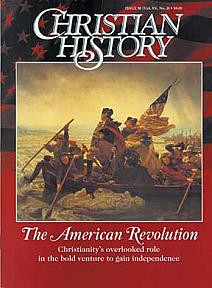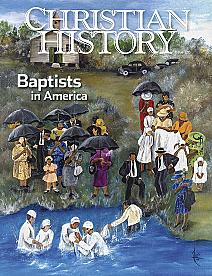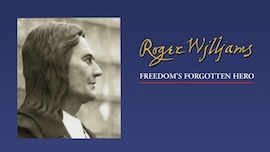Divine Light Enabled Isaac Backus to See Christ's Perfect Righteousness

Converted to Baptist views, Backus spread their doctrine, wrote their history, and pleaded for their rights.
ISAAC BACKUS grew up in New England during the Great Awakening—a spiritual revival of the eighteenth century that turned many Americans to Christ. Alarmed for his soul, seventeen-year-old Backus asked his pastor how he could be saved. His pastor was unsure. Powerless and frightened, Backus went about his business, praying desperately that God would show him what to do. One morning, while he was mowing a field, peace settled on him. “I was enabled by divine light to see the perfect righteousness of Christ and the freeness and riches of his grace.”
It seemed a shame to Backus that anyone should be left in darkness about salvation. He studied the Scripture, determined to be able to explain salvation to others. When he was twenty-two he began to preach. Two years later a “separate” church in Titicut, Massachusetts invited him to be their pastor. Separates had left the established Congregational church, considering its ministers spiritually dead. Backus accepted their call, pleading with the Lord to keep him from “any snare or evil way.”
Backus led the Separates for about eight years. However, as he studied Scripture, his views on baptism changed. The Separates believed baptism was for infants, but he became convinced it was only for Christians old enough to understand what they were doing. Although he accepted differences on the issue, his congregation became hostile to him and they parted ways.
On this day, 16 January 1756, Backus formed the first Baptist church in neighboring Middleboro. From this base he rode 1,200 miles a year as an evangelist throughout New England. The number of Baptists in the region increased from 1,500 to 21,000, largely through his efforts. He also helped found Rhode Island College (Brown University), America’s first Baptist college, and wrote a history of the Baptists in New England.
In the eighteenth century, Massachusetts taxed all alike to support Congregational churches. Anyone who refused to pay the tax could be harassed. Authorities jailed some and seized the property of others. Backus gathered the testimony of hundreds who had suffered harassment. He testified, wrote letters, printed pamphlets, and spoke throughout Massachusetts to make others aware of the problem. When he himself refused to pay the church tax, authorities jailed him, releasing him only because an anonymous benefactor stepped in and paid his tax.
For all his efforts, Backus did not live to see separation of church and state in Massachusetts. He died in 1806, but state funding of Congregational churches continued until 1833.
—Dan Graves
----- ----- -----
Backus is featured in "Christianity and the American Revolution: A Gallery of Christians in the Cause" in Christian History #50, American Revolution: Christianity’s Overlooked Role
For more about American Baptists, see Christian History #126, Baptists in America
Backus enjoyed a Baptist heritage thanks to Roger Williams: Freedom's Forgotten Hero. Watch at RedeemTV
Roger Williams can be purchased at Vision Video









